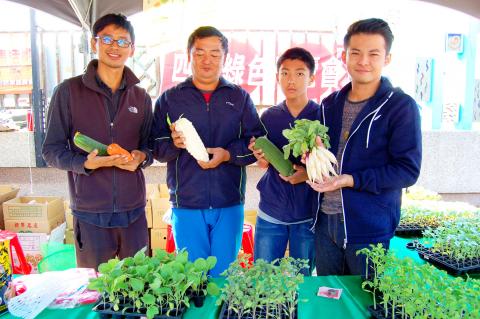The goal of making NT$1 million (US$30,242) per year has long been an aspiration for Taiwanese, and while most of those who are able to achieve that goal are white-collar workers, the experience of Tseng Chia-lin (曾加霖) and Huang Chun-hao (黃俊豪) have shown that young farmers can too.
The farmers’ association in Tainan’s Jiangjun District (將軍) has seen firsthand the impact of the nation’s aging demographics on the agricultural sector, as the average age of residents of local agricultural communities is about 62 years old, so it is taking steps to draw young people back to farming.
The association, in collaboration with the Council of Agriculture, provides subsidies to encourage young people to take up farming.

Photo: Yang Chin-cheng, Taipei Times
The association has established courses that help young farmers learn production management and marketing, and also sponsored farmers’ markets to aid the sale of farmers’ produce, association director-general Wu Ming-cheng (吳明成) said.
Traditional agriculture is labor intensive, which has discouraged young people from pursuing farming as a career, but recent years have brought changes in concepts regarding agriculture, Wu said.
Many of the young people now involved in farming in the district have left other professions and are interested in farming because they want to work closer to nature or to live in a rural area, Wu said.
Chen Li-hao (陳力豪), 24, is one such example.
He has a master’s degree in economics and used to work as stock analyst, but decided to move to Jiangjun two years ago because he no longer wanted to work in an office, Wu said.
Chen said he had no previous farming experience since he did not come from a farming family, but he was willing to bear the risks of natural disaster and pests that come with farming.
The majority of young farmers in the district are under 40 years old and some were able to make NT$1 million last year by growing corn, asparagus and fruits, Wu said.
Their achievements have come as a surprise to many older farmers, association staffer Lin Yen-liang (林彥良) said.
We hope that these young farmers will remain in the community to help rejuvenate farming villages and the industry as a whole, Wu said.
However, sounding like the analyst he once was, Chen said that farming was not a guaranteed ticket to a better life and individuals should weigh the risks accordingly.

Chinese Nationalist Party (KMT) Chairman Eric Chu (朱立倫), spokeswoman Yang Chih-yu (楊智伃) and Legislator Hsieh Lung-chieh (謝龍介) would be summoned by police for questioning for leading an illegal assembly on Thursday evening last week, Minister of the Interior Liu Shyh-fang (劉世芳) said today. The three KMT officials led an assembly outside the Taipei City Prosecutors’ Office, a restricted area where public assembly is not allowed, protesting the questioning of several KMT staff and searches of KMT headquarters and offices in a recall petition forgery case. Chu, Yang and Hsieh are all suspected of contravening the Assembly and Parade Act (集會遊行法) by holding

PRAISE: Japanese visitor Takashi Kubota said the Taiwanese temple architecture images showcased in the AI Art Gallery were the most impressive displays he saw Taiwan does not have an official pavilion at the World Expo in Osaka, Japan, because of its diplomatic predicament, but the government-backed Tech World pavilion is drawing interest with its unique recreations of works by Taiwanese artists. The pavilion features an artificial intelligence (AI)-based art gallery showcasing works of famous Taiwanese artists from the Japanese colonial period using innovative technologies. Among its main simulated displays are Eastern gouache paintings by Chen Chin (陳進), Lin Yu-shan (林玉山) and Kuo Hsueh-hu (郭雪湖), who were the three young Taiwanese painters selected for the East Asian Painting exhibition in 1927. Gouache is a water-based

Taiwan would welcome the return of Honduras as a diplomatic ally if its next president decides to make such a move, Minister of Foreign Affairs Lin Chia-lung (林佳龍) said yesterday. “Of course, we would welcome Honduras if they want to restore diplomatic ties with Taiwan after their elections,” Lin said at a meeting of the legislature’s Foreign Affairs and National Defense Committee, when asked to comment on statements made by two of the three Honduran presidential candidates during the presidential campaign in the Central American country. Taiwan is paying close attention to the region as a whole in the wake of a

OFF-TARGET: More than 30,000 participants were expected to take part in the Games next month, but only 6,550 foreign and 19,400 Taiwanese athletes have registered Taipei city councilors yesterday blasted the organizers of next month’s World Masters Games over sudden timetable and venue changes, which they said have caused thousands of participants to back out of the international sporting event, among other organizational issues. They also cited visa delays and political interference by China as reasons many foreign athletes are requesting refunds for the event, to be held from May 17 to 30. Jointly organized by the Taipei and New Taipei City governments, the games have been rocked by numerous controversies since preparations began in 2020. Taipei City Councilor Lin Yen-feng (林延鳳) said yesterday that new measures by